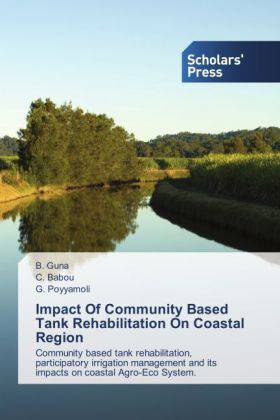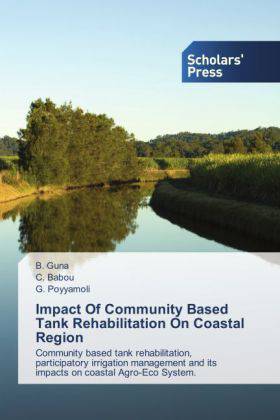
- Afhalen na 1 uur in een winkel met voorraad
- Gratis thuislevering in België vanaf € 30
- Ruim aanbod met 7 miljoen producten
- Afhalen na 1 uur in een winkel met voorraad
- Gratis thuislevering in België vanaf € 30
- Ruim aanbod met 7 miljoen producten
Zoeken
Impact Of Community Based Tank Rehabilitation On Coastal Region
B Guna, C Babou, G Poyyamoli
Paperback | Engels
€ 103,45
+ 206 punten
Omschrijving
Freshwater is a finite and precious resource that is essential for sustaining life, as are the natural systems that provide and maintain its supply. Irrigation has been a vital input for food security and sustainable livelihoods, especially in developing countries during the Green Revolution, since it has increased income and improved health and nutrition, locally, and by bridging the gap between production and demand, nationally. As demand increases, this vital, irreplaceable resource is becoming increasingly scarce. A potential crisis is looming where available resources can no longer meet the growing needs. Over exploitation of groundwater by increased number of bore wells, culminates in seawater intrusion into the groundwater aquifers. To overcome such problems, the Governments of many countries worldwide have already recognized the need for transferring management responsibilities to water users. The major reasons for Participatory Irrigation Management Transfer are: improving irrigation system performance and productivity and programs of respective governments; enhancing the sustainability and reducing environmental impacts.
Specificaties
Betrokkenen
- Auteur(s):
- Uitgeverij:
Inhoud
- Aantal bladzijden:
- 388
- Taal:
- Engels
Eigenschappen
- Productcode (EAN):
- 9783639703269
- Verschijningsdatum:
- 6/02/2014
- Uitvoering:
- Paperback
- Formaat:
- Trade paperback (VS)
- Afmetingen:
- 152 mm x 229 mm
- Gewicht:
- 566 g

Alleen bij Standaard Boekhandel
+ 206 punten op je klantenkaart van Standaard Boekhandel
Beoordelingen
We publiceren alleen reviews die voldoen aan de voorwaarden voor reviews. Bekijk onze voorwaarden voor reviews.











